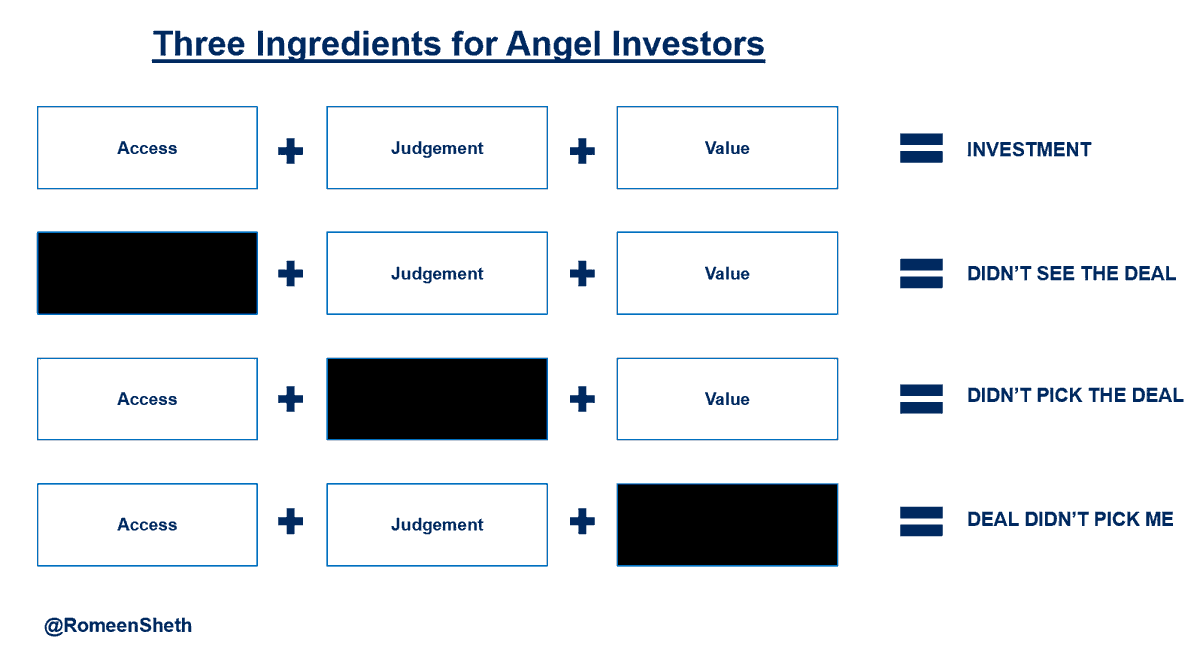
0/ [THREAD] I went deep with @avlok, CEO of @AngelList Venture on the future of venture capital, what he’s learned from @naval and his belief on why we’re just in the first innings of tech
10 Lessons on disruption, rolling funds, startups and angel investing:
10 Lessons on disruption, rolling funds, startups and angel investing:
1/ Expand the pie
AngelList decided not to focus on the “Founder-Investor” match problem (zero sum game).
Instead, they focused on using software to create more Investors, thereby creating more Founders.
Expanding market can = 10x the impact of resegmenting the market.
AngelList decided not to focus on the “Founder-Investor” match problem (zero sum game).
Instead, they focused on using software to create more Investors, thereby creating more Founders.
Expanding market can = 10x the impact of resegmenting the market.
2/ Time, not capital is the constraint of the investing ecosystem
# of GPs * GP hours = the total amount of time investors have to meet founders.
⬆️investors + ⬆️investor time (via software) = ⬆️more startups funded = ⬆️likelihood of innovation.
# of GPs * GP hours = the total amount of time investors have to meet founders.
⬆️investors + ⬆️investor time (via software) = ⬆️more startups funded = ⬆️likelihood of innovation.
3/ If you believe there are only a finite number of venture backable companies, you have to believe there is a limit on human creativity
Reducing friction in financing creates an explosion of companies.
"We're hitting the limit" is synonymous with "we're out of ideas."
Reducing friction in financing creates an explosion of companies.
"We're hitting the limit" is synonymous with "we're out of ideas."
4/ I’m not a businessman. I’m a business, man.
Regulatory changes (506c) + democratization of tools (e.g. rolling funds) is empowering solo capitalists.
Rolling funds are a symptom of a larger tectonic shift - trust is shifting away from institutions and towards individuals.
Regulatory changes (506c) + democratization of tools (e.g. rolling funds) is empowering solo capitalists.
Rolling funds are a symptom of a larger tectonic shift - trust is shifting away from institutions and towards individuals.
5/ The internet gives you infinite leverage and by extension infinite possibility.
This is the best time to start a company - markets are larger than they’ve ever been, the ecosystem is highly mature and the “no code stack” allows non-technical people to enter the arena.
This is the best time to start a company - markets are larger than they’ve ever been, the ecosystem is highly mature and the “no code stack” allows non-technical people to enter the arena.
6/ Innovation comes from reducing friction
When you remove steps in a process, you remove friction. By eliminating friction you can take on additional workload.
AngelList removed friction from funding + redistributed workload towards increasing funding in the ecosystem.
When you remove steps in a process, you remove friction. By eliminating friction you can take on additional workload.
AngelList removed friction from funding + redistributed workload towards increasing funding in the ecosystem.
7/ First principle thinking is over referenced, but underutilized.
Ask what could be, if the existing system did not exist.
“If software built a venture fund today, what would it look like?'' - this question kick started AngelList’s build of rolling funds.
Ask what could be, if the existing system did not exist.
“If software built a venture fund today, what would it look like?'' - this question kick started AngelList’s build of rolling funds.
8/ “You can’t create a market” is a myth
More customer value = stronger customer = larger customer = more customer needs = new product/market opportunity.
Repeat cycle.
For @AngelList, ⬆️investment products = ⬆️startups = ⬆️needs = ⬆️AL products.
More customer value = stronger customer = larger customer = more customer needs = new product/market opportunity.
Repeat cycle.
For @AngelList, ⬆️investment products = ⬆️startups = ⬆️needs = ⬆️AL products.
9/ Startups only need to focus on 3 things - (1) Capital, (2) Talent, (3) Customers.
If you’re trying to add value in the ecosystem, align with one of those 3 pillars. AL uses this framework:
Capital - AngelList Venture
Talent - AngelList Talent
Customers - @ProductHunt
If you’re trying to add value in the ecosystem, align with one of those 3 pillars. AL uses this framework:
Capital - AngelList Venture
Talent - AngelList Talent
Customers - @ProductHunt
10/ We’re only scratching the surface of tech's impact
Early stage startups as a whole are in a recursive loop of being systematically undervalued. There’s 50x room to run in this ecosystem.
Even that may be selling it short.
Never bet against human creativity.
Early stage startups as a whole are in a recursive loop of being systematically undervalued. There’s 50x room to run in this ecosystem.
Even that may be selling it short.
Never bet against human creativity.
• • •
Missing some Tweet in this thread? You can try to
force a refresh





